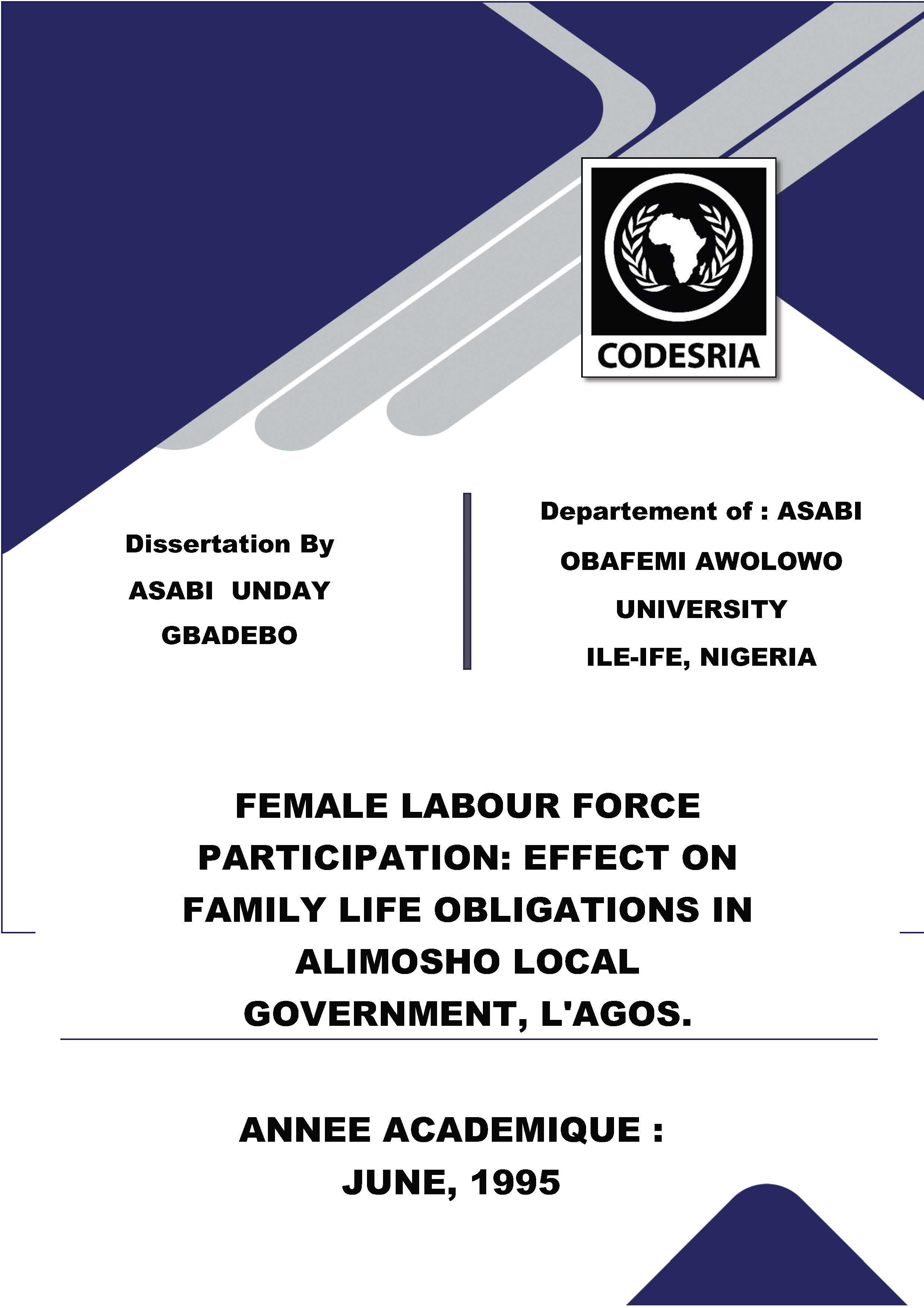FEMALE LABOUR FORCE PARTICIPATION: EFFECT ON FAMILY LIFE OBLIGATIONS IN ALIMOSHO LOCAL GOVERNMENT, L'AGOS
Mots-clés :
FEMALE LABOUR FORCE, EFFECT ON FAMILY LIFE, ALIMOSHO LOCAL GOVERNMENTSynopsis
This study focuses on the examination of the effect of female labour force participation on their family life obligations in Alimoso Local Government Area of Lagos State. In this connexion, a socio-economic model was developed in which 5 categories of variables are involved. These include Background characteristics, Employment history, wife-husband relationship, fertility history andPractice of family planning. The analysis of the datais based on the information from 310 female respondents who have been married and who were currently working as at the time of the survey. The study made use of two methods in its attempt to measure the relationship between the independent and dependent variables. These methods are simple cross tabulations and logistic regression model. The findings reveal the following: (1) The working women in the informal sector are likely to enjoy a longer duration of breastfeeding. (2) Couples or respondents in the higher incarne group, Nl,600+, may decide to shorten their duration of breastfeeding due toc their greater financial strength to buy breastmilk substitutes. (3) Mothers with number of children within the bracket 1-4 are more likely to enjoy working away from home. (4) Women in the formal sector are likely to experience an increased odds of having to cook their husbands' meals. (5) The majcrity of the women
are working as an alternative means of supplementing their husbands' income. ( 6) Some working mothers leave their children at the mercy of somebody or people at home while away to work especially where the extended family or kinship system is operative. At times, working mothers combine both work and childcare.
Téléchargements
Références
Adewuyi A.A. (1980) Childcare and Female Employment in a Nigerian Metropolis: The role of the under
six's, The Nigerian Journal of Economie and Social Studies. Vol. 22, No. 2, pp. 197 - 218.
Adewuyi A.A. (1983) Female Employment and Fertility: A case study of Two socio-economically
contrasting Area in Lagos, Nigeria. (forthcoming).
Appiah, R. (1990) 11The Socio-Economic Profile of Female-Headed Households in Ghana11• United
Nations Expert Group Meeting on Vulnerable Women, Vienna, 26 - 30 Novèmber 1990.
Blanc, A. K. t al. (1990) 11Women's childrearing Strategies in Relations to fertility and Employtnent in Ghana11• Research division Working Paper No. 16, Population Council.
Buvinic, M. et a;. 91983) Women and Poverty in the Third World. pp. 272 - 299.
Collver (1968) 11Women's work participation and Fertility in metropolitan areas 11, Demography Vol. IV, No. 1, 1968, pp. 55 - 60.
Davanzo, J. 91972) The Determination of Family Formation in Chile, 1960: An Econometric study of
Female Labour Force Participation, Marriage and Fertility Decisions. (A report prepared for Agency for International development) .
Davis, K. 91982) "Wives and Work: Consequence of The Sex Role Revolution11• Population and
Development Review. Vol. 10, No. 3, pp. 409 - 413.
Dwyer, D. H. 91983) Women and Income in the Third World: Implication for policy (New York, The
Population Council) Working paper no. 18, June 1983.
Domenico, C. M. et. al. (1988) 11Urban Yoruba mothers: at home and at work" In C. Oppong (ed.) Sex
roles, Population and Development in West Africa, Heinemann educational Books, Inc., pp. 118 -
Ebigbola, J. A. (1988) The Effect of Modernization on Family Size and Reproductive Attitude of Yoruba Women, Nigeria. Demography India, Vol. 17, No. 2, (1988), pp. 227 - 241.
Goldstein (1972) "The influence of married women in the Urban labour Market in Selected latin
America countries: Chile, Costa Rica, ecuador, and Venezuela, in G. Standing, G. Sheehan (eds.),
Labour Force Participation in Low Income countries, Geneva, ILO, pp. 51 - 74.
Heer D.M. (1964) Fertility Differences Between Indian and Spanish speaking Parts of Andean
Countries, Population Studies, 19(1), July, pp. 71 - 84.
Lacey, L. 1986 "Women in the Development Proèess: Occupational mobility of female migrants in
cities in Nigeria" in Journal of Comparative Family Studies.
Long, C. (1958) The Labour Force under Changing incarne and Employment (Princeton, Princeton
University Press)
Makinwa adebusoye, P.K. (1985) contribution of Nigeria women to Paper presented at the Seminar
Development, 1985, Ibad "The socio-economic national development". on Womén in National
Mason, B.J. (185) "Jamaican Working-class Women: Producers and Reproducers" Revies of Black
Political Economy 14, 2 - 3 (Fall-Winter) : 259 - 275.
Namboodirei, N. K. (1962) The wife's work Experience and Child Spacing, (Ph.D Dissertation in
Sociology) Social System and Human Fertility: Toward a Theoretical Framework, Ann Arbor, University
of Michigan, 1962
Oppenheimer, V. K. 91982) Work and Family: A Study in Social
Demography (Studies in Population pp. 289 - 352.
Pittin, R. (1988) "Documentation of Women's Work in Nigeria: Problems and Solutions". In Christine
Oppong (ed.,) Sex Roles, Population and Development in West Africa, pp. 25
- 44.
Raimi, M.O. Working Mothers Nigeria: Example of a (Forthcoming) .and Fertility city in Oyo in South-West State (1990
Stycos and weller (1967) 11Female working role and fertility11• Demography, Vol. IV, No. 1, 1967,
pp. 210 - 217.
Sweet, J.A. (1973) Women in.Labour Force (New York, Seminar Press).
Tilly, L.A. et al. (1976) Marriage and Fertility: Studies in Interdisciplinary History, Journal of Interdisciplinary History. VI: 3 (Winter 1976), 447 - 476.
Tobert, A.L. et al. (1991) 11Women's Schooling and child Care in the Demographic transition: A Mexican Case Study. Population and Development Review. 17. Ni. 3 (September 1991).






